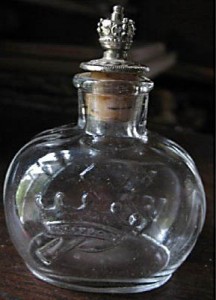 From a reader…
From a reader…
QUAERITUR:
Our TLM group shares a church with the NO parish and they have removed holy water from the stoops at the entrance. Apparently our Bishop has instructed this to be done to avoid anything being “shared”. Is this reasonable? I don’t understand the logic behind it.
Some chanceries and parishes are freaking half-way out. Half-way, because they don’t mention the backs of pews or door handles, etc., that people grab.
Remove Holy Water… well, okay.
However, there should still be Holy Water available at church, in a large container. BYOB. Bring your own bottle, fill it, and use it going into church!
Then use it going in and out of your home!
It could be that this virus scare will raise awareness of what Holy Water is for.
As I have written many times, Holy Water is blessed for use by people precisely for health of soul and of body. It’s right there in the traditional blessing of Holy Water. I confine myself to the traditional form, which blessed Holy Water, rather than the newfangled form which probably institutes “happy water”.
Need a bottle? HERE
And…


































Our priest announced before every mass last weekend (paraphrasing) “Each of you has a right to access to holy water. Even though the font is empty, I will happily bless any containers of water you bring for your use.” And then re-iterated the storage and usage of containers of holy water.
Our pastor has blessed “Holy Hand Sanitizer” at every entrance. Where is the eyeroll emoji?
Our Priest used an Aspergillum to bless us all with Holy Water…..and I always keep my font at home full! :)
You can’t fix stupid…
And you can’t define logic in that which is inherently illogical.
Here in our village Church of St. Ulrich, Holy water remains in small fonts at both entrances. Should folks be reticent about using these fonts, then one can obtain Holy water for personal use from a large beautiful ‘vat’ within the church itself. Although this is normally for those who wish to have Holy water available at grave sites in the village cemetery, but I am certain there would be no objections for such personal use under current circumstances.
“Stoup” is the spelling. Sounds the same, though. From a Germanic/Dutch word for “jug, vessel.”
There is nothing wrong with making a hand sanitizer sacramental by blessing it. Same thing for soap. But holy water is supposed to be a more venerable or specialized kind of sacramental than just sacramentals made by blessing stuff.
Not that ordinary blessed stuff is nothing. The remains of my Assumption blessed fruit, buried in my garden, apparently brought back my poor mutilated, pesticided rose bush last year. (The building’s manager had hired bad help.) I just hadn’t wanted to throw the end of a sacramental into the trash! Imagine how startled I was when the rosebush revived, and did fine this winter too!
I guess the question is whether hand sanitizer is more an object or an alcohol.
I’m told Fr. Heilman has something going on at Roman Catholic Man about the Wuhan Virus holy water shortage and free Epiphany Water bottles. [Guess who blessed it.]
“It could be that this virus scare will raise awareness of what Holy Water is for.” My two cents: there will be other blessings from this Wuhan Virus.
Would it be OK to use water mixed with chlorine or some other substance to kill off germs? My first thought was to replace it with Holy Rubbing alcohol but figured it at least needed to have actual water in it.
Padre, I think a Canadian ’60s band can only bless Groovy water.
from the Weller translation for the blessing of Holy Water (Priests, use this blessing but always in Latin)
… O God, who for man’s welfare established the most wonderful mysteries in the substance of water, hearken to our prayer, and pour forth your blessing + on this element now being prepared with various purifying rites. May this creature of yours, when used in your mysteries and endowed with your grace, serve to cast out demons and to banish disease. May everything that this water sprinkles in the homes and gatherings of the faithful be delivered from all that is unclean and hurtful; let no breath of contagion hover there, no taint of corruption; let all the wiles of the lurking enemy come to nothing. By the sprinkling of this water may everything opposed to the safety and peace of the occupants of these homes be banished, so that in calling on your holy name they may know the well-being they desire, and be protected from every peril; through Christ our Lord. …
To take this sacramental away from the people in times of pestilence is egregiously imprudent.
[It is good for people to read these translations, so that they know what the Church intends for Holy Water use. However, priests must use Latin in blessing Holy Water, not Weller.]
Fr. Kelly says: To take this sacramental away from the people in times of pestilence is egregiously imprudent.
True. But a lot of priests don’t use the formula you quoted. Some even just improvise. To be deprived of that water may not be much of a loss.
After our monthly TLM on Sunday, our priests broke out their trusty copies of the Rituale Romanum and blessed a huge quantity of water, salt, candles and rosaries that we brought. God bless them.
Pingback: VVEDNESDAY EDITION – Big Pulpit
Anita Moore, O.P.(lay) says: But a lot of priests don’t use the formula you quoted. Some even just improvise.
If they are, and are calling it Holy Water, then they are already depriving the faithful of this most important sacramental.